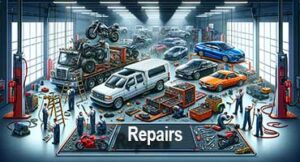The Evolution of Auto Mechanics: A Historical Perspective - Houston Edition
2024.10.29
Automotive Repairs
From the first gasoline powered automobile by Karl Benz in 1886 to today’s cutting edge electric vehicles, the automotive industry has been a fascinating journey of innovation and advancement. Parallelly, the profession of auto mechanics too, once primarily dealing with simple mechanical repairs, has evolved considerably alongside these technological leaps. This article will take a journey through the evolution of auto mechanics, exploring how it continues to adapt to advancements in automotive technology.
During the early days of motoring at the turn of the 20th century, automobiles were relatively basic machines mostly required mechanical adjustments. Early auto mechanics needed fundamental knowledge about engine components like carburetors and spark plugs. It was essentially an extension of bicycle or horse drawn carriage repair work. Consequently, those involved in car repair wore multiple hats – they were blacksmiths, engineers, and inventors rolled into one.

As we moved towards mid 20th century and automobiles became more widespread and complex due to advancements such as automatic transmissions or power steering; need for specialized skills among mechanics grew substantially. The introduction of electronics in cars also meant understanding electrical systems beyond just knowing your way around under a hood – marking important shift within mechanic profession towards increased specialization.
Fast forward into late 20th & early 21st century when microprocessors started managing various vehicle functions from fuel injection systems or anti lock brakes evolving cars into computer controlled machines triggering even further changes within auto mechanic field.
Technicians now had to comprehend complex computerized diagnostics systems used for troubleshooting issues becoming crucial part making ‘mechanics’ evolve into ‘technicians’. Use OBD (On-board diagnostics) became standard allowing technicians access trouble codes directing them towards source issue making diagnosis accurate efficient compared earlier trial and error methods involving time consuming disassembling/reassembling parts.
Due vehicular complexity rise modern era emphasized importance education certification creating structured career paths aspiring technicians formalizing process learning expertise which once relied purely apprenticeship experience.
Associations like ASE (National Institute Automotive Service Excellence) set professional standards while vocational schools offered courses aspects automotive repair providing theoretical practical training preparing students high tech demands industry ensuring they’re ready handle sophisticated vehicles today beyond.
Today’s technicians face new challenges – advent alternative propulsion systems particularly electric hybrids requiring dedicated knowledge battery management system safety concerns surrounding high voltage present electric cars adding another layer complexity skill-set necessary being contemporary technician.
Looking ahead autonomous driving connectivity features of integration emerging trends inevitably impact field requiring constant upskilling stay relevant but also opening doors exciting opportunities within servicing calibration advanced driver assistance systems (ADAS) cybersecurity vehicle data privacy paving way new specializations thus continuing evolution this dynamic profession.
So from humble beginnings tweaking mechanical parts tireless tinkerers yesterday’s grease monkeys have transformed today’s highly skilled technicians equipped tackle complexities modern day vehicles navigating continuous waves technological change reflecting resilience adaptability inherent this ever evolving trade ultimately dedicated keeping world moving safely efficiently regardless what drives our future.
Through examining past understanding roots development realize how far auto mechanics profession come while also appreciating technological strides made within automotive industry informing us evolving skillsets requirements will shape future this essential field.
